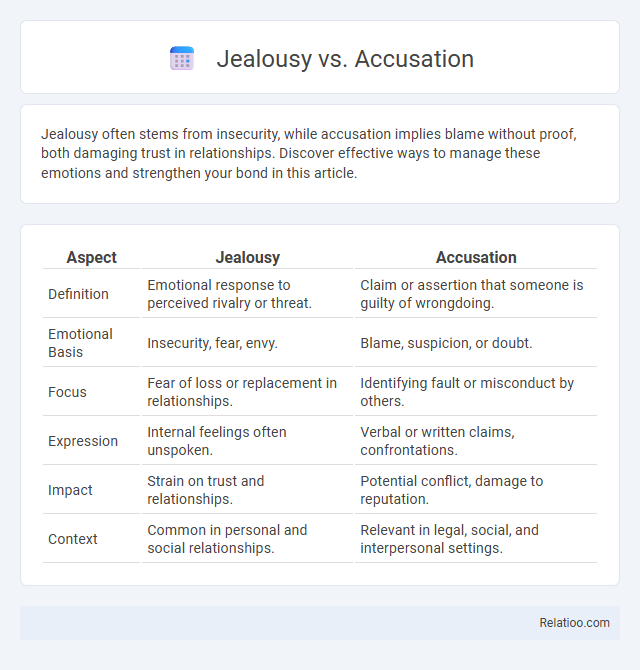Jealousy often stems from insecurity, while accusation implies blame without proof, both damaging trust in relationships. Discover effective ways to manage these emotions and strengthen your bond in this article.
Table of Comparison
| Aspect | Jealousy | Accusation |
|---|---|---|
| Definition | Emotional response to perceived rivalry or threat. | Claim or assertion that someone is guilty of wrongdoing. |
| Emotional Basis | Insecurity, fear, envy. | Blame, suspicion, or doubt. |
| Focus | Fear of loss or replacement in relationships. | Identifying fault or misconduct by others. |
| Expression | Internal feelings often unspoken. | Verbal or written claims, confrontations. |
| Impact | Strain on trust and relationships. | Potential conflict, damage to reputation. |
| Context | Common in personal and social relationships. | Relevant in legal, social, and interpersonal settings. |
Understanding Jealousy: Definition and Causes
Jealousy arises from the fear of losing something valuable, often triggered by feelings of insecurity or perceived threats to a relationship. Understanding jealousy involves recognizing its roots in emotional dependency, low self-esteem, or past experiences of betrayal. Your ability to identify these causes helps in managing jealousy constructively without letting it escalate into baseless accusations.
What Constitutes an Accusation in Relationships
An accusation in relationships involves a specific claim or assertion that one partner has committed a wrongdoing, which often stems from perceived evidence or suspicion rather than jealousy's emotional response. Unlike jealousy, which is an internal feeling of insecurity or fear of loss, an accusation explicitly puts blame on the other person, affecting trust and communication dynamics. Understanding that accusations rely on explicit claims helps distinguish them from jealousy-driven assumptions, enabling healthier conflict resolution.
Psychological Roots of Jealousy vs Accusation
Jealousy often stems from deep-seated insecurities and fear of loss, triggering emotional responses tied to perceived threats in relationships. Accusation arises when these emotions are projected outward, manifesting as blame or suspicion without concrete evidence. Understanding your psychological roots can help differentiate genuine concerns from irrational accusations, promoting healthier communication and emotional regulation.
Jealousy vs Accusation: Key Differences
Jealousy involves feelings of insecurity and fear about losing something valued, often arising from perceived threats to relationships, while accusation is the act of alleging someone's wrongdoing without necessarily involving emotional insecurity. Jealousy typically triggers emotional responses that may lead to suspicion and mistrust, whereas accusation focuses on assigning blame or fault based on observed evidence or assumptions. Understanding jealousy centers on internal emotional dynamics, whereas accusation deals with outward expressions aimed at identifying responsibility.
Common Triggers for Jealousy and Accusatory Behavior
Common triggers for jealousy often stem from perceived threats to your relationships or self-esteem, such as rivalry, insecurity, or lack of trust. Accusation arises when assumptions lead to blaming others without concrete evidence, frequently fueled by misunderstandings or emotional stress. Recognizing these triggers can help you manage jealousy and avoid unfair accusations, fostering healthier communication and stronger connections.
Emotional Impact: The Toll on Individuals and Couples
Jealousy often triggers intense emotional distress, fostering insecurity and mistrust that erode individual well-being and relationship stability. Accusations amplify these negative emotions by introducing blame and defensiveness, which can escalate conflicts and damage communication between partners. The combined emotional toll of jealousy and accusations frequently leads to heightened anxiety, decreased intimacy, and increased risk of relationship dissolution.
How Jealousy Manifests Compared to Accusations
Jealousy manifests through emotional responses such as insecurity, envy, and possessiveness, often resulting in subtle behaviors like suspicion or withdrawal. Accusations, in contrast, are explicit claims or statements that assign blame or wrongdoing to another person, typically expressed verbally or in writing. While jealousy stems from internal feelings, accusations serve as external actions aimed at confronting or challenging perceived offenses.
Effective Communication to Address Jealousy and Accusations
Jealousy often stems from insecurity and can lead to accusatory behavior that strains relationships. Effective communication involves actively listening to Your partner's concerns, expressing feelings without blame, and seeking clarity before jumping to conclusions. By fostering an open dialogue, you can address jealousy and accusations constructively, promoting trust and understanding.
Healthy Boundaries: Preventing Jealousy and False Accusations
Setting healthy boundaries is essential for preventing jealousy and false accusations in relationships, as clear communication helps you manage expectations and reduce misunderstandings. Establishing mutual respect and trust minimizes feelings of insecurity that often lead to jealousy and unfounded blame. Prioritizing emotional awareness and open dialogue creates a secure environment where accusations are replaced by constructive conversations.
Seeking Help: Therapy and Recovery Strategies
Jealousy often triggers emotional turmoil that can lead to unfounded accusations, complicating relationships and mental health. Seeking help through therapy allows you to explore underlying insecurities and develop recovery strategies that promote trust and emotional regulation. Cognitive-behavioral therapy (CBT) and mindfulness are effective approaches to manage jealousy and address accusatory behaviors constructively.

Infographic: Jealousy vs Accusation
 relatioo.com
relatioo.com